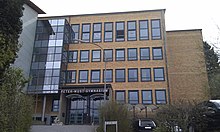Peter-Wust-Gymnasium (Merzig)
| Peter-Wust-Gymnasium | |
|---|---|
|
|
|
| type of school | high school |
| founding | 1888 |
| address |
Goethestrasse 16 a |
| place | Merzig |
| country | Saarland |
| Country | Germany |
| Coordinates | 49 ° 26 '39 " N , 6 ° 39' 15" E |
| carrier | Merzig-Wadern district |
| student | ~ 800-900 |
| Teachers | about 70 |
| management | Andrea's chest |
| Website | www.pwg-merzig.de |
The Peter-Wust-Gymnasium (short: PWG ) is a mathematical , scientific and linguistic high school in the city of Merzig , which is attended by approx. 900 students and employs around 70 teachers. It is named after the philosopher Peter Wust .
history
The Peter-Wust-Gymnasium in Merzig is the oldest high school in the district town. It was founded in 1888 by an initiative of wealthy Merzig citizens. Classes began on January 5, 1889, and the school was named “Private Higher Daughter School”. Until 1979 it was an all-girls high school. From 1889 to 1919 the headmistress was Maria Beck, who drew attention to the grammar school with good performance. At that time, English and French were taught as foreign languages . In 1920 the city of Merzig became the sponsor of the school. In 1939 the Abitur examinations were carried out for the first time at the girls' school, which from 1940 onwards were on a par with the linguistic examinations in domestic form. This increased the number of female students.
After the Second World War, the school was nationalized and thus became a "girls' high school", where French and Latin were taught as foreign languages from Grade 5 and English from Grade 8. From 1958 the central high school diploma could be completed at the girls high school.
The steadily increasing number of pupils made it necessary to build a new school in 1961, which led to a change of location to Goethestrasse. After the sponsorship of the school was transferred from the state to the district, a building for the natural science subjects was built in 1998, which was able to start operations in 1999. In 2007, work began on a second school gym, which was overdue for years and which went into operation in 2009. The school was last expanded in 2018 when a new music and art building was opened.
In 1975 the school was named after the Rissenthal philosopher Peter Wust , following a vote by the teaching staff at the time . Because of the co-education , boys have also been attending the PWG since 1979. Today 40 percent of the students are boys. In memory of the school's namesake, there is an annual Peter Wust Prize, which is awarded to high school graduates with outstanding achievements in religion and philosophy.
In 1984, twenty-five students from the PWG and Heiner Timmermann visited Erich Honecker, the chairman of the GDR's state council . That was the only time that Honecker had a West German class visit his office.
In September 2019 the headmistress Gabriele Hewer retired, her successor as headmistress has been Andreas Brust since March 2020.
Competitions
Students of the PWG annually attend German and European competitions such as the European competition , the reading competition in experiment Students , Young Scientists , debated youth , Mathematical Olympiad , youth training for the Olympics or the Kangaroo competition . The PWG received a number of special prizes, including in the categories of European competition, junior competition and the sports badge competition.
Mission statement
As part of school development, teachers and students created the mission statement, personality (P), knowledge (W), community (G).
Further principles of the school are:
- A respectful and tolerant approach
- To live the high school educational concept, to demand performance and to rely on the promotion of individual abilities
- To realize education as a joint task of pupils, teachers and parents
- To create a pleasant climate in the school as a learning and living space
- To prepare the students for the professional, ethical and social challenges of the future
- To achieve sustainability in terms of knowledge and skills
- To attach importance to stimulating and professional equipment of the rooms
- To work continuously on improving the quality of schools and teaching
principal
- 1889–1919: Maria Beckers
- 1919–1930: Anna Balkenhol
- 1930–1945: Klara Hartmann
- 1946–1948: Elisabeth Baum ( acting )
- 1948–1957: Maria Kiefer
- 1958: Peter Gärtner ( acting )
- 1958: Christoph Gansen ( acting )
- 1958–1962: Wilhelm Laubenthal
- 1962–1976: Adolf Rodé
- 1976-1994: Peter Lorson
- 1994–2011: Heinz Lafontaine
- 2011–2019: Gabriele Hewer
- since March 2020: Andreas Brust
Partnerships
- Paul-Gerhardt-Gymnasium Graefenhainichen

- Seward High School, Seward

- Collège La Millenaire, Thionville

- Ensemble Scolaire Sainte-Marie, Sarrebourg

- Collège Jean Monnet, St. Jorioz

- Collège Pierre Claude, Sarre-Union

Former known students
- Martin Berger , cathedral music director and university professor
- Daniela Schlegel-Friedrich , politician
- Kevin Trapp , professional soccer player (Eintracht Frankfurt)
- Anke Rehlinger , politician, Minister for Economic Affairs of the Saarland
- Stefan Palm (politician) , member of the Saarland state parliament
- Sebastian Baumgart , actor
Individual evidence
- ↑ Super User: Mission statement of the PWG. Accessed June 19, 2018 (German).

